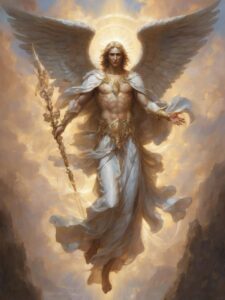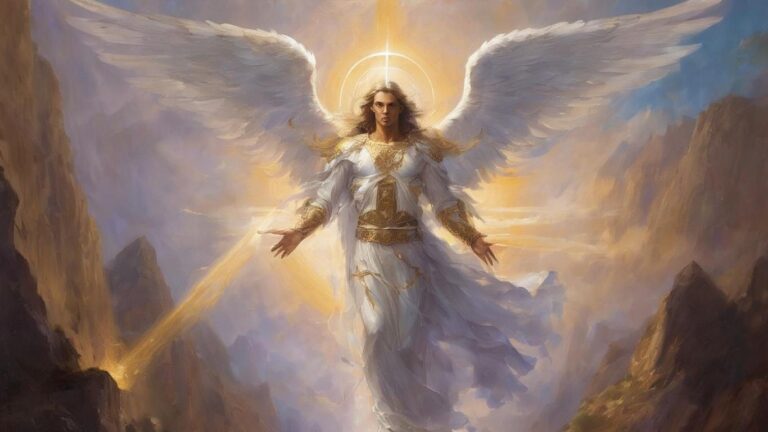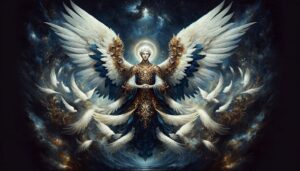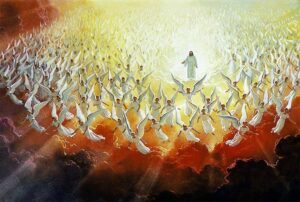Table of Contents
Zadkiel is a figure often mentioned in various religious and mystical traditions, primarily within the context of Judeo-Christian beliefs. The name Zadkiel is most commonly associated with archangels and angelology.
In Christian mysticism and some esoteric traditions, Zadkiel is often considered one of the archangels. The archangels are typically seen as high-ranking angels with specific roles and responsibilities in the divine hierarchy. Zadkiel is sometimes associated with concepts such as mercy, compassion, and forgiveness. The name “Zadkiel” itself is often interpreted to mean “Righteousness of God.”
Origin

The name “Zadkiel” has its origins in ancient Hebrew. In Hebrew, “Zadkiel” (צַדְקִיאֵל) is derived from two root words: “zadik,” meaning “righteous” or “just,” and “El,” which is a common abbreviation for Elohim, one of the names for God in Hebrew. Therefore, “Zadkiel” is often interpreted to mean “Righteousness of God” or “Justice of God.”
The concept of archangels and angelic beings, including Zadkiel, has roots in various religious texts, including the Hebrew Bible (Old Testament) and Christian scriptures. While specific details about Zadkiel and other archangels are not always explicitly outlined in these texts, the interpretations and elaborations on their roles and attributes have developed over time within religious and mystical traditions. As a result, the understanding of Zadkiel may vary among different religious and esoteric communities.
Physical Description
Descriptions of angelic beings, including archangels like Zadkiel, are often more symbolic and metaphorical in religious and mystical traditions rather than detailed physical descriptions. In art and literature, angels are often depicted as ethereal and otherworldly, with features that convey a sense of divine or spiritual significance. They may be portrayed with wings, radiant light, and a sense of purity.
In the case of Zadkiel, if we consider the broader symbolism associated with the name (meaning “Righteousness of God” or “Justice of God”), artistic representations and descriptions may emphasize qualities related to justice, mercy, and compassion. Zadkiel might be depicted as a benevolent and compassionate figure, perhaps holding symbols associated with justice or mercy.
It’s important to note that the descriptions of angels, including archangels, can vary widely across different traditions, and there may not be a standardized physical description. Additionally, some traditions may emphasize the non-physical or spiritual nature of these beings, focusing more on their roles and attributes than on their physical appearance.
Personality
In various religious and mystical traditions, archangels like Zadkiel are often associated with specific qualities and attributes rather than a detailed personality profile. The name “Zadkiel,” meaning “Righteousness of God” or “Justice of God,” suggests a focus on concepts such as justice, mercy, and righteousness.
Zadkiel is often considered a benevolent and compassionate figure, embodying the divine qualities of mercy and forgiveness. As an archangel, Zadkiel may be seen as an intercessor or advocate for humanity, particularly in matters related to justice and moral integrity. The emphasis on righteousness suggests a commitment to upholding moral and ethical standards.
While specific personality traits may not be explicitly outlined, the general understanding is that Zadkiel’s nature aligns with divine virtues and a compassionate concern for the well-being of individuals. The interpretation of Zadkiel’s personality can vary across different religious and esoteric traditions, and much of the understanding is derived from symbolic and metaphorical representations rather than explicit descriptions.
In Modern Usage and Symbolism

In modern usage and symbolism, Zadkiel is often invoked or referenced within the context of spirituality, metaphysics, and esoteric traditions. People may turn to the concept of Zadkiel for inspiration or guidance, especially when seeking qualities associated with justice, mercy, and righteousness. Here are a few ways in which the name Zadkiel may be used in contemporary contexts:
Spirituality and Personal Growth: Zadkiel may be invoked in spiritual practices and rituals as a symbol of divine compassion and forgiveness. Individuals may seek inspiration from the archetype of Zadkiel when working on personal growth, seeking forgiveness, or striving for moral and ethical conduct.
Esoteric and New Age Beliefs: In some esoteric and New Age traditions, archangels, including Zadkiel, are considered guides and sources of positive energy. Practitioners may meditate on or invoke the energy associated with Zadkiel for purposes such as healing, emotional balance, and spiritual transformation.
Symbol of Justice and Compassion: Zadkiel’s association with justice and compassion may be utilized as a symbol in various contexts, including social justice movements or organizations promoting ethical and compassionate values.
Literature and Art: Artists and writers may incorporate the figure of Zadkiel into their works, using the symbolism associated with the name to convey themes of justice, mercy, and divine intervention.
Ralated and similar creatures
In various religious, mythological, and folklore traditions, there are entities or beings similar to the archangelic figure Zadkiel, often associated with divine attributes, guidance, or specific aspects of the human experience. Here are a few examples:
Archangels: In Judeo-Christian traditions, archangels are high-ranking celestial beings with specific roles and responsibilities. Michael, Gabriel, Raphael, and Uriel are commonly mentioned alongside Zadkiel.
Angels of Mercy: Some traditions feature angels associated specifically with mercy, compassion, and healing. These angels may be invoked for comfort and assistance in times of suffering.
Deities of Justice: In various mythologies, there are gods and goddesses associated with justice and order. For example, in Greek mythology, Themis and her daughter Dike represent divine law and justice.
Spirit Guides: In spiritual and esoteric traditions, individuals may believe in spirit guides or guardian angels who offer guidance, protection, and assistance on one’s life journey.
Benevolent Spirits: Folklore and mythology often include benevolent spirits or supernatural beings that assist and protect humans. These entities may be associated with nature, the elements, or specific virtues.
Ascended Masters: In certain spiritual and New Age beliefs, ascended masters are enlightened beings who have transcended the cycle of rebirth. They are thought to guide and support individuals on their spiritual paths.
Dharmapala (Dharma Protectors): In Buddhism, Dharmapalas are protective deities or spirits associated with the defense of Buddhist teachings. They may be fierce or wrathful, symbolizing the forceful removal of obstacles.
Tutelary Deities: Various cultures have beliefs in tutelary deities, protective spirits, or patron saints who watch over individuals, communities, or specific activities.
Zadkiel FAQ
Who is Zadkiel?
Zadkiel is an archangel often associated with qualities of justice, mercy, and righteousness in Judeo-Christian traditions.
What does the name "Zadkiel" mean?
The name "Zadkiel" is derived from Hebrew, meaning "Righteousness of God" or "Justice of God."
In which religious tradition is Zadkiel mentioned?
Zadkiel is primarily associated with Judeo-Christian traditions, including the Hebrew Bible and Christian scriptures.
What is Zadkiel's role as an archangel?
Zadkiel is often seen as an archangel embodying qualities of mercy, compassion, and divine justice. The role includes intercession on behalf of humanity.
Is Zadkiel portrayed with specific gender characteristics?
No, traditional depictions of Zadkiel do not ascribe gender characteristics, as angels are often considered genderless spiritual beings.
What virtues are associated with Zadkiel?
Zadkiel is associated with virtues such as justice, mercy, compassion, and the divine aspect of righteousness.
How is Zadkiel invoked in modern contexts?
In modern contexts, people may invoke Zadkiel for inspiration, guidance, and support in matters related to justice, forgiveness, and personal growth.
Are there other archangels often mentioned alongside Zadkiel?
Yes, Michael, Gabriel, Raphael, and Uriel are commonly mentioned as fellow archangels in various traditions.
Does Zadkiel have a specific symbol?
While specific symbols may vary, Zadkiel is often associated with symbols of justice, such as scales or a flaming sword.
In what way is Zadkiel relevant in art and literature?
Artists and writers may incorporate Zadkiel as a symbolic figure, representing themes of justice, mercy, and divine intervention in their works.
How is Zadkiel depicted in art?
Is Zadkiel mentioned in any specific religious texts?
References to Zadkiel can be found in various religious texts, including the Hebrew Bible and certain Christian apocryphal writings.
Can individuals invoke Zadkiel for specific purposes?
Yes, individuals may invoke Zadkiel in spiritual practices for purposes such as seeking forgiveness, guidance, and assistance in matters of justice.
Does Zadkiel play a role in angelic hierarchies?
Yes, in some angelic hierarchies, Zadkiel is considered one of the archangels, holding a prominent position in the celestial order.
What emotions or qualities are associated with Zadkiel's energy?
Zadkiel's energy is often associated with feelings of compassion, mercy, forgiveness, and the transformative power of divine justice.
Are there specific prayers or invocations dedicated to Zadkiel?
Yes, various prayers and invocations exist in spiritual traditions for individuals seeking the guidance and support of Zadkiel.
How does Zadkiel relate to the concept of divine mercy?
Zadkiel is often regarded as an embodiment of divine mercy, offering compassion and forgiveness to those who seek it.
In what contexts might someone call upon Zadkiel's assistance?
People may call upon Zadkiel for help in matters of justice, resolving conflicts, finding forgiveness, and navigating ethical dilemmas.
Is Zadkiel recognized in non-Christian spiritual traditions?
While primarily associated with Christian traditions, elements of Zadkiel's qualities may resonate with individuals in broader spiritual and metaphysical contexts.
Does Zadkiel have a feast day or specific celebration in any religious calendar?
Unlike some saints or angels, Zadkiel does not have a widely recognized feast day in traditional religious calendars, but individual practitioners may choose to honor Zadkiel in their own spiritual practices.




